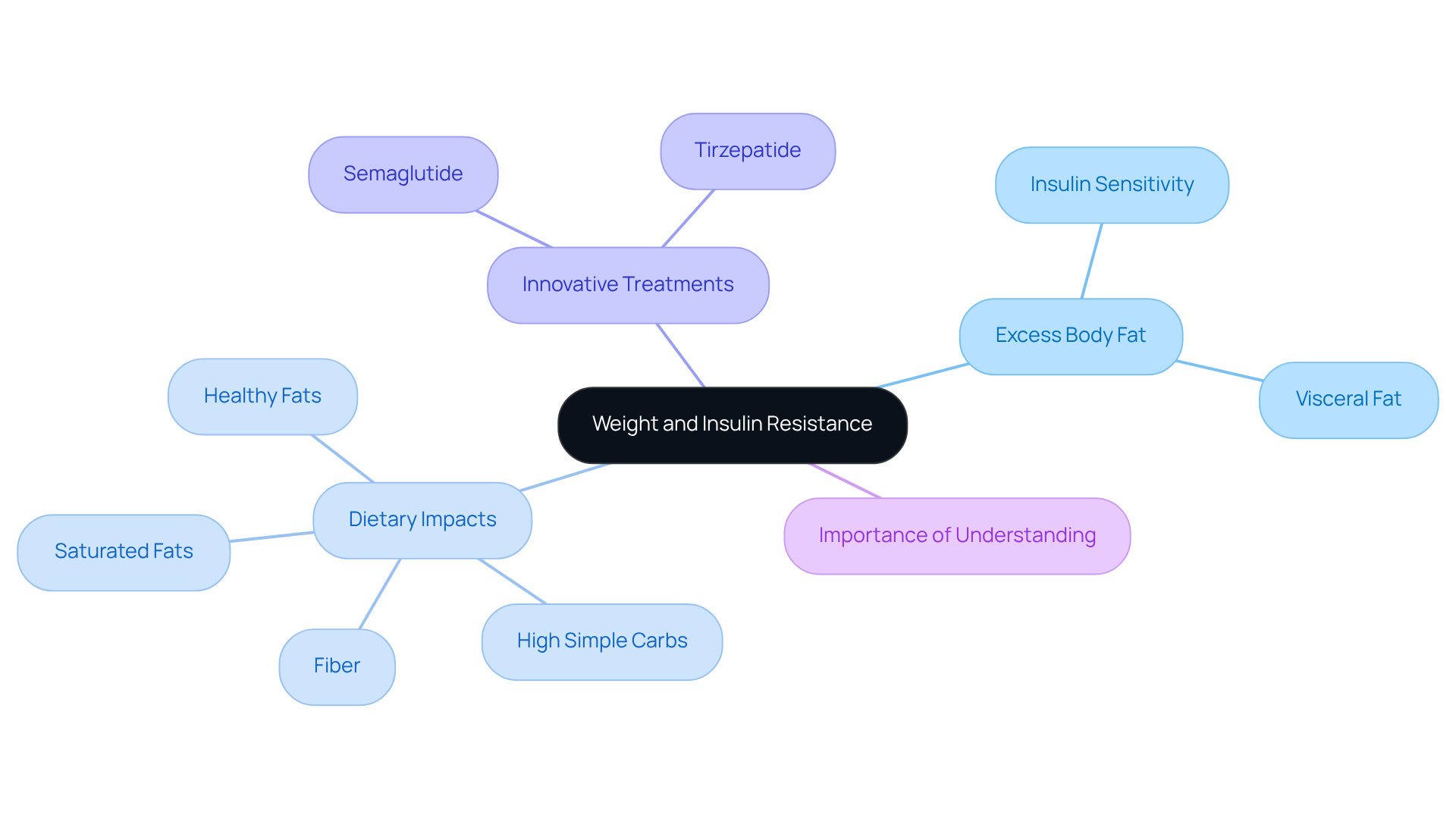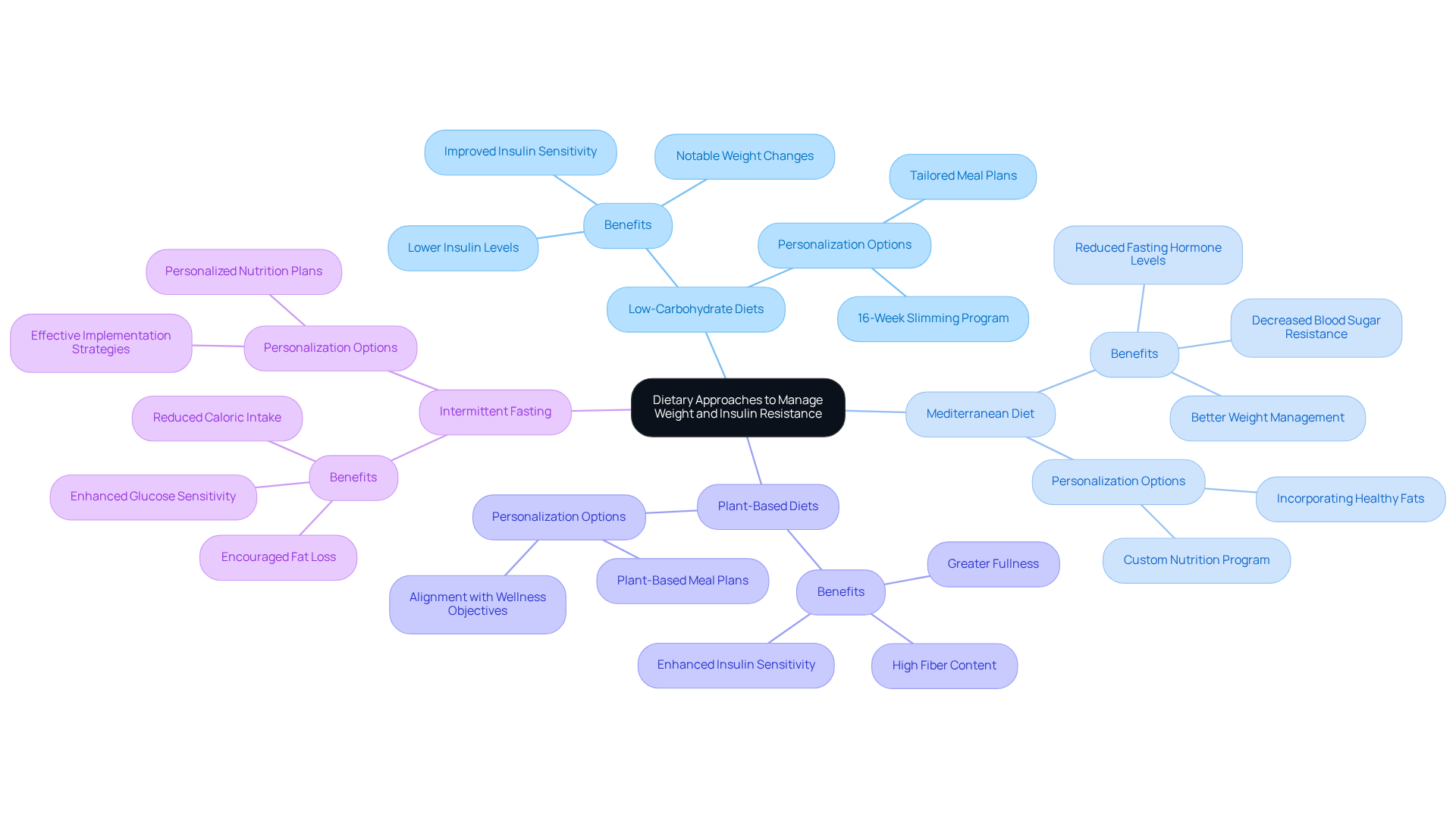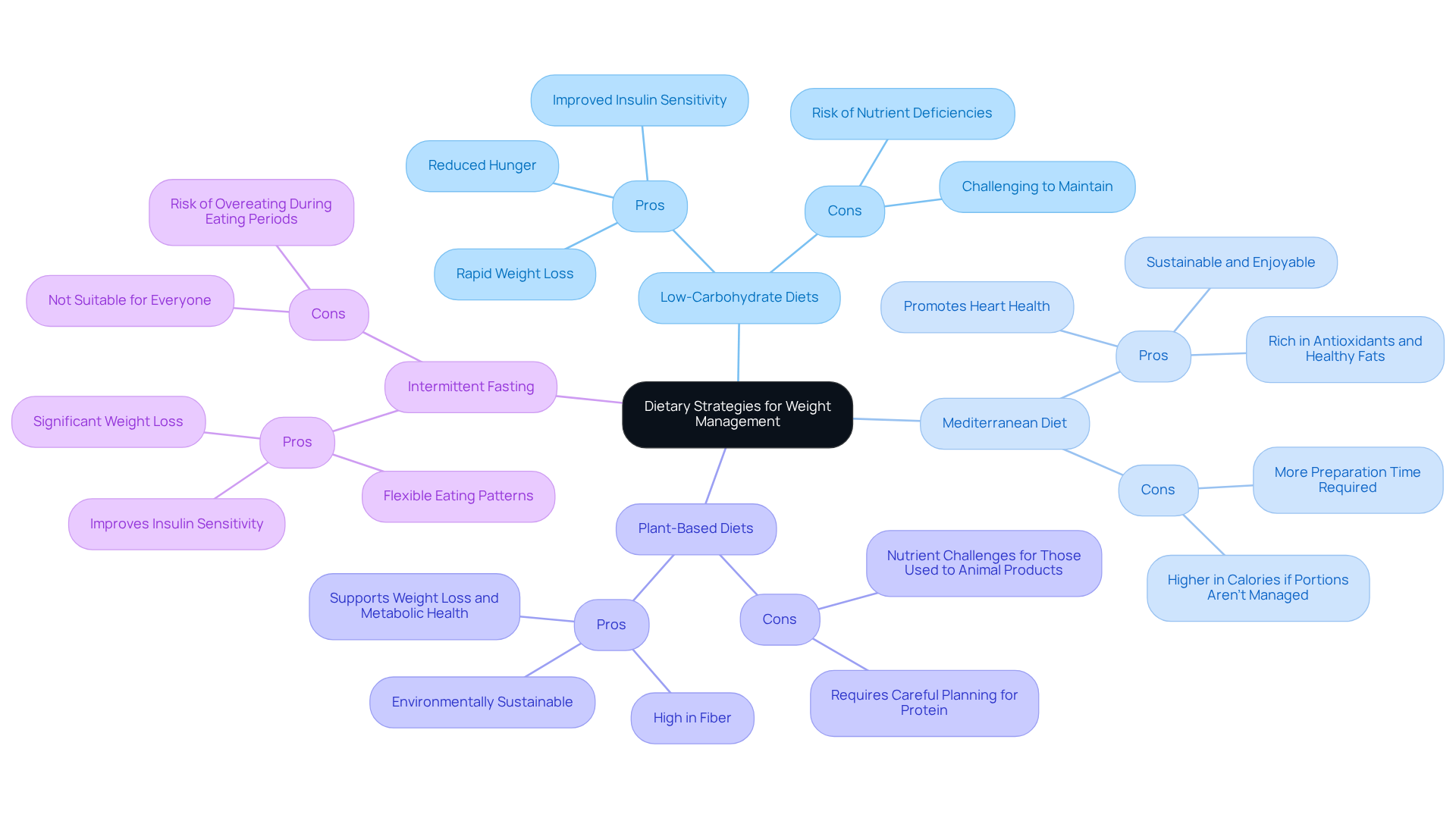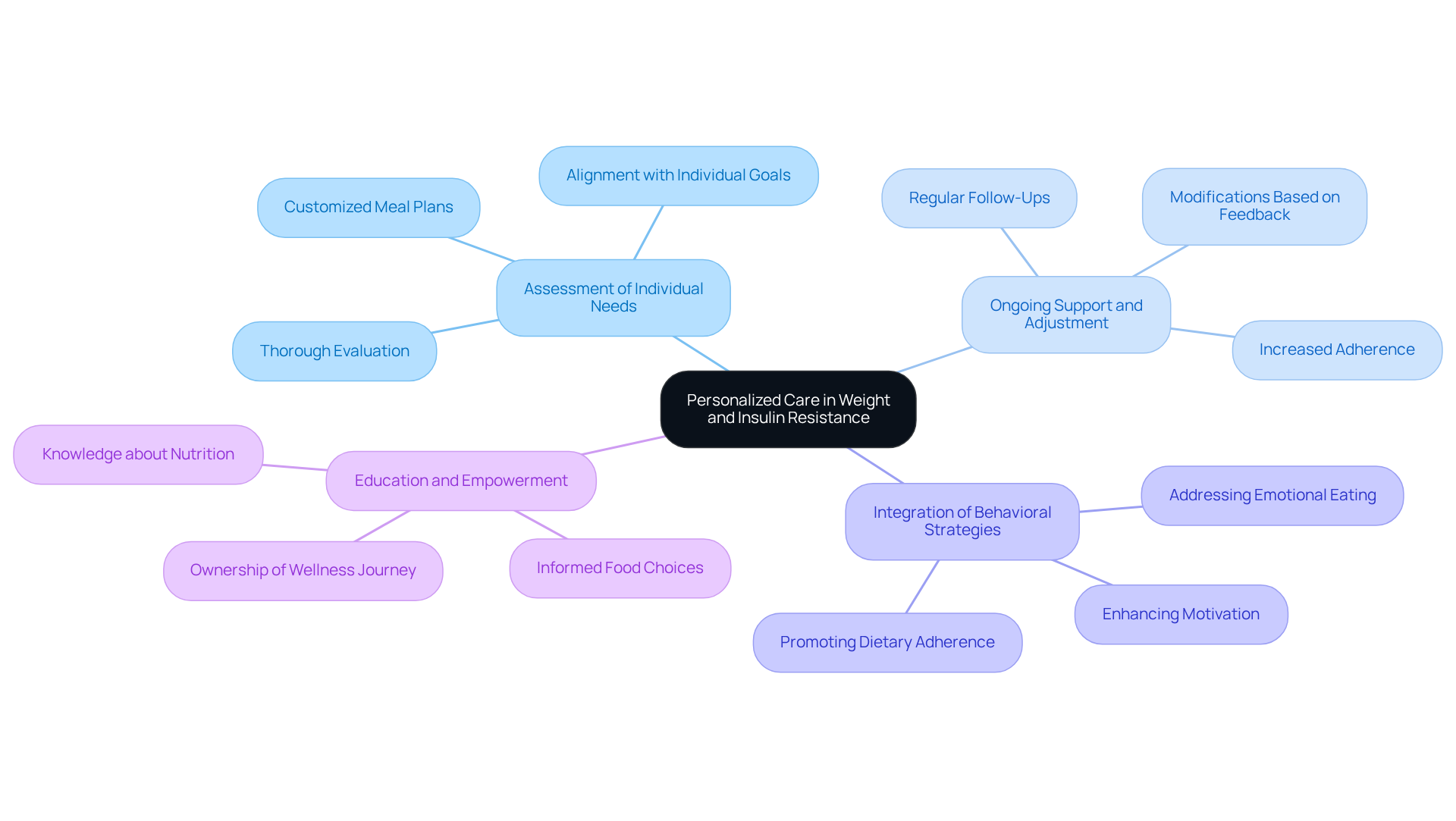Introduction
Understanding the relationship between weight and insulin resistance is crucial, especially as many of us face challenges with rising obesity rates and metabolic disorders. We know that navigating this health landscape can feel overwhelming. This article explores various dietary strategies designed not just to help with weight loss but also to improve insulin sensitivity, offering a supportive roadmap for healthier living.
But with so many options available – from low-carbohydrate diets to Mediterranean and plant-based approaches – how do you find the right path for you? You’re not alone in this journey. By unpacking the benefits and challenges of each strategy, we can uncover the keys to achieving your personal health goals while making sense of the complexities of nutrition.
In addition, we’ll share relatable scenarios and insights to help you feel more connected and empowered as you take steps toward a healthier lifestyle.
Understanding Weight and Insulin Resistance
We understand that the connection between weight and insulin resistance can feel overwhelming, but it’s important to know that they are closely related. Excess body fat, particularly visceral fat, can contribute to weight and insulin resistance, leading to a situation where your body’s cells become less responsive to insulin, the hormone that helps regulate blood sugar. This can result in elevated blood sugar levels, which may be a precursor to type 2 diabetes.
Recognizing this connection is essential for creating effective nutritional plans aimed at improving glucose sensitivity and supporting body mass loss. Studies show that diets high in simple carbohydrates and saturated fats can worsen glucose resistance, while those rich in fiber and healthy fats can enhance your metabolic health.
Moreover, innovative treatments like Semaglutide and Tirzepatide can be part of the solution. These medications promote feelings of fullness by delaying gastric emptying, allowing you to enjoy smaller portion sizes while feeling satisfied after meals. This comprehensive approach to body management not only addresses blood sugar resistance but also promotes the management of weight and insulin resistance.
Therefore, understanding the relationship between body mass and weight and insulin resistance is crucial. It empowers you to customize nutritional interventions and integrate effective medical solutions that tackle both challenges. Remember, you’re not alone in this journey, and with the right support and knowledge, you can take meaningful steps towards better health.

Exploring Dietary Approaches to Manage Weight and Insulin Resistance
Exploring Dietary Approaches to Manage Weight and Insulin Resistance
We understand that managing weight and insulin resistance can be challenging. But there are various dietary strategies that can help you on this journey, and we’re here to support you every step of the way.
-
Low-Carbohydrate Diets: By limiting carbohydrate intake, these diets can significantly lower insulin levels and improve insulin sensitivity. Research shows that individuals adhering to low-carb diets often experience notable changes in weight and insulin resistance. Within the framework of our 16-week slimming program, we can create personalized low-carb meal plans tailored to your preferences and goals.
-
Mediterranean Diet: This diet is rich in fruits, vegetables, whole grains, and healthy fats. It’s associated with decreased blood sugar resistance and better management of weight and insulin resistance. Studies indicate that following this diet can lead to reduced fasting hormone levels, reinforcing its importance for overall well-being. Our Custom Nutrition Program can guide you in incorporating this diet into your lifestyle with tailored support.
-
Plant-Based Diets: Focusing on whole, plant-based foods, these diets enhance insulin sensitivity and support the management of weight and insulin resistance. Their high fiber content promotes greater fullness and improved metabolic health, making them a valuable option for those looking to manage their size. We can assist you in developing a plant-based meal plan that aligns with your wellness objectives during the 16-week program.
-
Intermittent Fasting: This nutritional approach alternates between eating and fasting periods, which can enhance glucose sensitivity and encourage fat loss by reducing overall caloric intake. Our nutritionists are here to provide strategies for effectively implementing intermittent fasting as part of your personalized plan.
Each of these nutritional approaches offers unique benefits and can be tailored to meet your personal health objectives and preferences. At CT Medical Weight Loss & Beyond, our Custom Nutrition Program is designed specifically around your body, goals, and lifestyle. You’re not alone in this journey; we provide personal support and expert advice from certified nutritionists to help you implement these strategies effectively and sustainably.

Comparing the Effectiveness of Dietary Strategies: Pros and Cons
When managing weight and insulin resistance, we recognize that selecting the appropriate dietary strategy can seem overwhelming. Let’s take a closer look at some popular options, considering their pros and cons, so you can find what works best for you.
Low-Carbohydrate Diets
- Pros: These diets can lead to rapid weight loss, significantly improve insulin sensitivity, and help reduce hunger.
- Cons: However, they may be challenging to maintain over the long term and could lead to nutrient deficiencies if not carefully planned.
Mediterranean Diet
- Pros: This approach is not only sustainable but also enjoyable. It promotes heart health and is rich in antioxidants and healthy fats.
- Cons: On the downside, it may require more preparation time and can be higher in calories if portion sizes aren’t managed.
Plant-Based Diets
- Pros: These diets are high in fiber, support weight loss and metabolic health, and are environmentally sustainable.
- Cons: They do require careful planning to ensure you’re getting enough protein and nutrients, which can be a challenge if you’re used to animal products.
Intermittent Fasting
- Pros: This method can lead to significant weight loss, improve insulin sensitivity, and offers flexible eating patterns.
- Cons: However, it may not be suitable for everyone, especially those with specific medical conditions, and there’s a risk of overeating during eating periods.
Understanding these advantages and disadvantages can empower you to select a nutritional approach that aligns with your lifestyle, preferences, and wellness goals. Remember, you’re not alone in this journey; we’re here to support you every step of the way.

The Role of Personalized Care in Managing Weight and Insulin Resistance
Efficiently handling weight and insulin resistance requires customized care. We understand that personal metabolic reactions to food can vary greatly due to genetics, lifestyle, and medical conditions. That’s why a customized nutritional approach is vital for achieving optimal results.
-
Assessment of Individual Needs: Conducting a thorough evaluation of your eating habits, health status, and personal preferences allows for the creation of customized meal plans that align with your individual goals. This personalized evaluation is crucial for addressing specific nutritional needs related to weight and insulin resistance.
-
Ongoing Support and Adjustment: Regular follow-ups and modifications to your nutrition plans based on progress and feedback help you stay on track and motivated. Research shows that individuals who receive ongoing support are more likely to stick to their nutritional plans, which can lead to improved weight loss results and positively impact weight and insulin resistance.
-
Integration of Behavioral Strategies: Effective personalized care incorporates behavioral strategies that tackle emotional eating, motivation, and adherence to dietary changes. These elements are critical for long-term success, helping you navigate challenges and maintain your commitment to healthier eating habits.
-
Education and Empowerment: Offering knowledge about nutrition and the impact of food selections on your well-being enables you to make informed choices. This knowledge fosters a sense of ownership over your wellness journey, encouraging sustainable lifestyle changes.
Integrating individualized support into nutritional approaches not only boosts effectiveness but also encourages enduring enhancements in body management and glucose sensitivity. Real-world examples demonstrate that tailored dietary plans can lead to significant weight loss and improved health metrics. You’re not alone in this journey; individualized approaches are key in combating weight and insulin resistance.

Conclusion
Understanding the relationship between weight and insulin resistance is crucial for developing effective dietary strategies. We recognize that navigating these challenges can be overwhelming, but by understanding how body fat influences insulin sensitivity, you can make informed choices that enhance your metabolic health and promote sustainable weight loss.
Key dietary strategies, such as:
- low-carbohydrate diets
- the Mediterranean diet
- plant-based diets
- intermittent fasting
each offer unique benefits and drawbacks. These approaches can be tailored to fit your individual preferences and health goals. Remember, personalized care is significant in achieving optimal results. You’re not alone in this journey; ongoing support, education, and behavioral strategies are vital in maintaining motivation and adherence to dietary changes, ultimately leading to better health outcomes.
Embracing a personalized approach to nutrition empowers you to take control of your health. It fosters lasting changes in weight management and insulin sensitivity. By exploring these dietary strategies and seeking expert guidance, you can navigate the complexities of weight and insulin resistance more effectively. Together, we can pave the way for a healthier future.
Frequently Asked Questions
What is the relationship between weight and insulin resistance?
Weight and insulin resistance are closely related; excess body fat, especially visceral fat, can make cells less responsive to insulin, leading to elevated blood sugar levels and potentially type 2 diabetes.
How does body fat affect insulin resistance?
Excess body fat, particularly visceral fat, contributes to insulin resistance by causing the body’s cells to become less responsive to insulin, which helps regulate blood sugar levels.
What dietary factors can influence insulin resistance?
Diets high in simple carbohydrates and saturated fats can worsen glucose resistance, while diets rich in fiber and healthy fats can improve metabolic health and enhance glucose sensitivity.
What are Semaglutide and Tirzepatide, and how do they help?
Semaglutide and Tirzepatide are innovative treatments that promote feelings of fullness by delaying gastric emptying, helping individuals enjoy smaller portion sizes while feeling satisfied after meals, which can aid in weight management and insulin resistance.
Why is it important to understand the connection between body mass and insulin resistance?
Understanding this connection is crucial for creating effective nutritional plans and integrating medical solutions that address both weight management and insulin resistance, empowering individuals to take meaningful steps towards better health.




